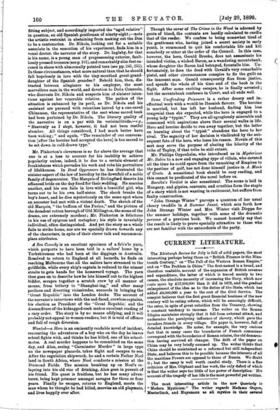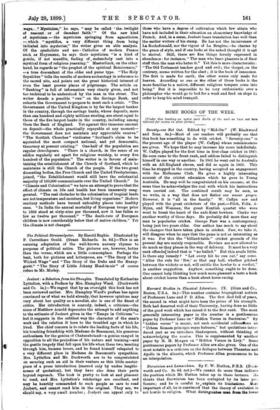The most interesting article in the new Quarterly i3 "
Modern Mysticism." The writer regards Madame Guyon, Maeterlinck, and Huysmann as all mystics in their several Mystieiam," he says, " may be called the twilight of , nascent , or of decadent faith.' " Of the new kind of mysticism e– the mysticism springing from agnosticism which " mystifies, a very different thing from being initiated into mysteries," the Writer gives an able analysis. Of the symbolists and nee - Catholics of modern France such as Huysniann, he says their mysticism "is a kind of gentle, if not maudlin, feeling of , melancholy cast into a mystical form of religious yearning." Maeterlinck, on the other hand, he regards as "the prophet of the spiritual Renaissance," —a true descendant of the older and purer type. "The Holy Sepulchre" tells the results of modern archaeology in reference to the sacred site, and points out the great historical interest of even the least proven. places of pilgrimage. The article on "-Banking" is full of information very clearly given, and not too technical to be understood by the man in the street. The writer dreads a possible " run" on the Savings Bank, and exhorts the Government to prepare to meet such a crisis. "The Government of the United Kingdom is by far the largest banker in the country, through the savings banks, whose deposits, more than one hundred and eighty millions sterling, are about equal to those of the five largest banks in the country, including among them the Bank of England. Yet against this immense amount on deposit—the whole practically repayable at any moment— the" Government does not maintain any appreciable reserve." "The Scottish Churches" vindicates " Scotland's claim to be aqcounted the most compact national, and yet democratic, theocracy at present existing." One-half of the population are regular churchgoers. " There is a church, in the sense of an edifice regularly set apart for religious worship, to every five hundred of the population." The writer is in favour of main- taining the establishment of the Church of Scotland, which he maintains is still the Church of the people. If the two great dissenting bodies, the Free Church and the United Presbyterians, joined, "the Establishment would still have the substantial majority of 160,000 communicants over the United Church." In "Climate and Colonisation" we have an attempt to prove that the effect of climate on life and health has been immensely exag- gerated. " The real obstacles to the colonisation of tropical lands are not temperature and moisture, but living organisms." Modern sanitary methods have turned unhealthy places into healthy ones. "In India the annual mortality of European troops prior to 1859 stood at sixty-nine per thousand, now it has fallen so leer as twelve per thousand." " The death-rate of European 'children is now considerably below that of native children." Yet the climate is not changed.



































 Previous page
Previous page